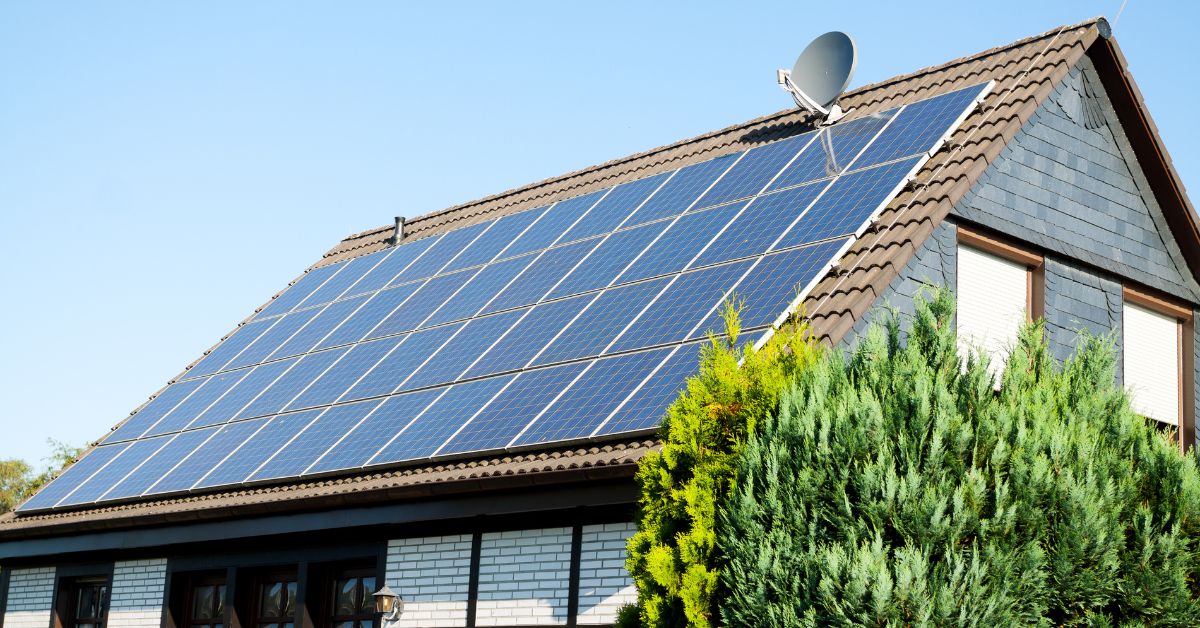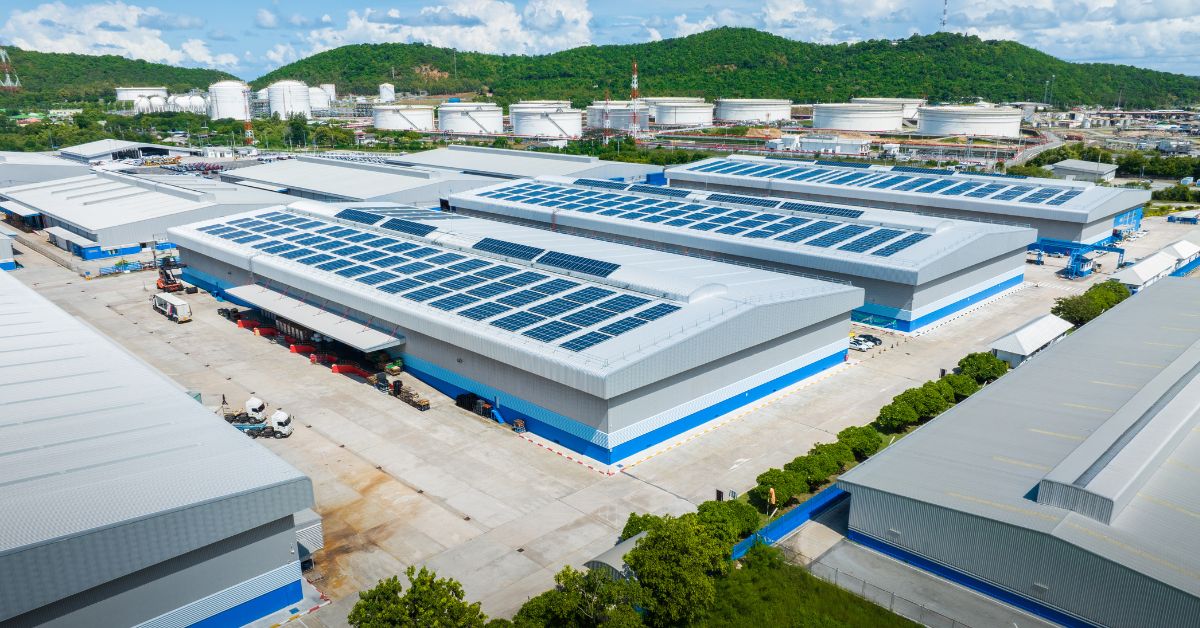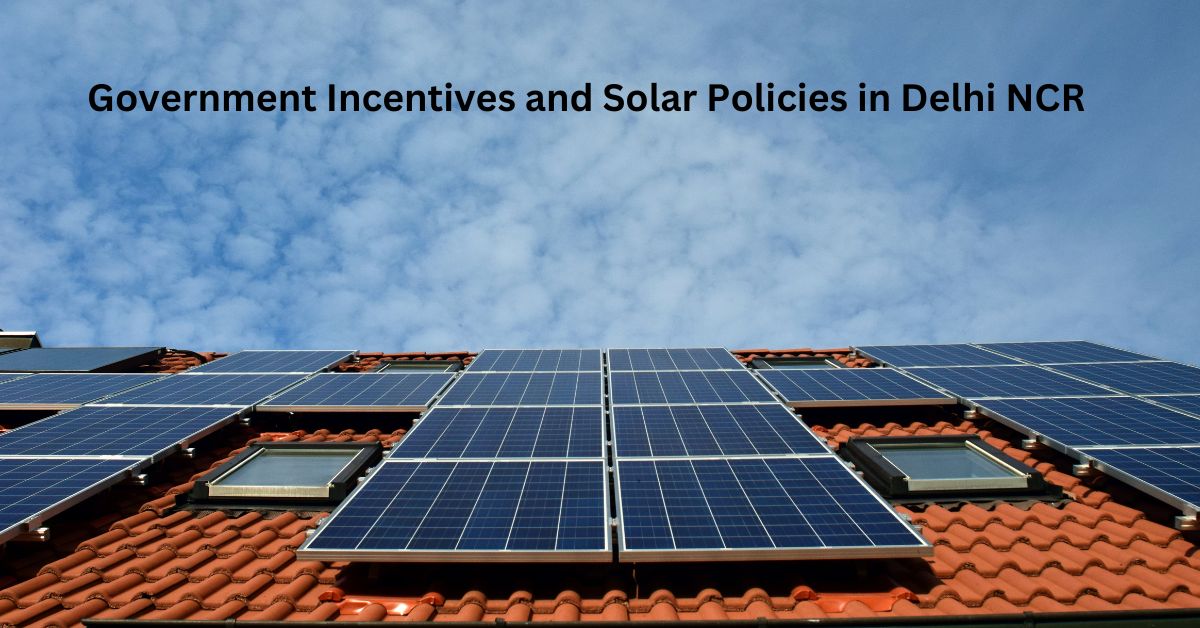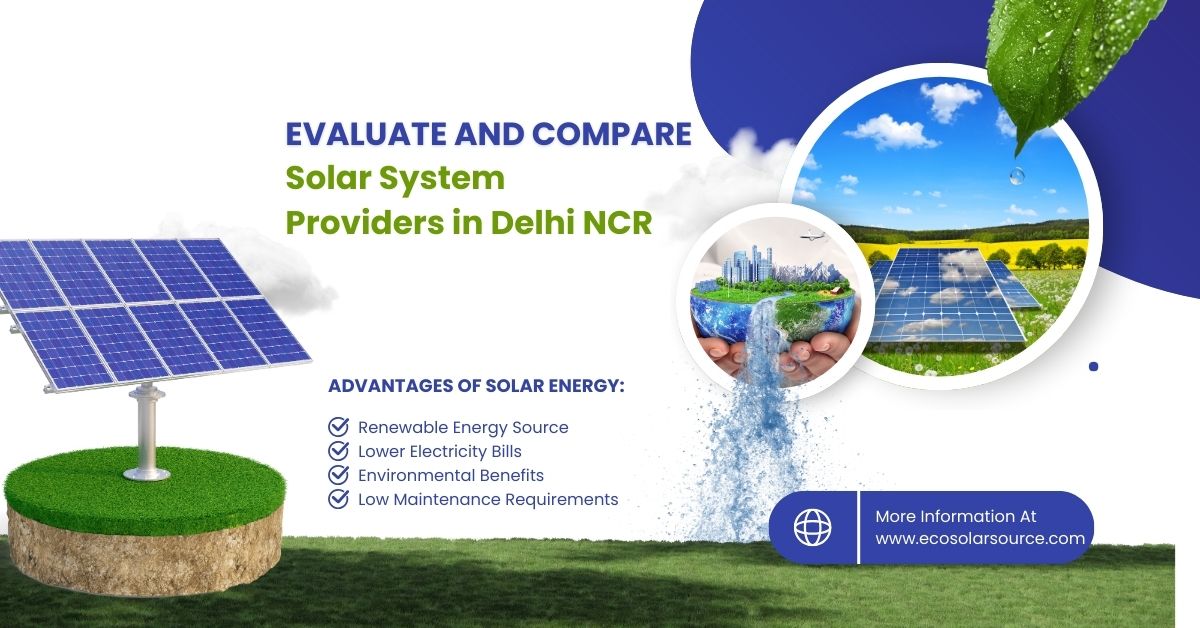Evaluate and Compare Solar System Providers in Delhi NCR
Know the details about Evaluate and Compare Solar System Providers in Delhi NCR. When evaluating and comparing solar system providers in Delhi NCR, focus on key aspects such as quality, cost, and services. Start by reviewing each provider’s experience, certifications, and customer reviews. Assess the range of products, including panel efficiency, inverter types, and battery options. Consider installation timelines, maintenance services, and warranties for long-term support.
Compare pricing structures to ensure transparency in costs, especially for financing options. Look for providers with strong after-sales support, responsiveness, and energy management tools. By scrutinizing these elements, you can choose a provider that best aligns with your energy needs and ensures reliable solar performance.
Table of Contents
Evaluate and Compare Solar System Providers in Delhi NCR
Solar energy has become one of the most reliable and eco-friendly renewable energy sources, offering an ideal solution to the increasing demand for electricity and the need to reduce environmental impact. With governments worldwide pushing for sustainable energy adoption, India has emerged as a leading player in the solar energy market. The Delhi National Capital Region (NCR), including the bustling city of Delhi and its satellite towns like Noida, Gurgaon, Faridabad, and Ghaziabad, is witnessing rapid growth in the solar energy industry. With a combination of abundant sunlight and rising electricity costs, many residents and businesses are now exploring solar power as a viable option.
In this article, we will evaluate and compare the leading solar system providers in Delhi NCR. This comprehensive guide will assist you in choosing the right solar system provider and evaluating their services, technology, pricing, customer service, and after-sales support.
Understanding Solar Energy and the Indian Market
Before diving into the evaluation of solar system providers in Delhi NCR, it is essential to understand the fundamentals of solar energy and the factors driving its adoption in India.

a) How Solar Energy Works
Solar energy systems convert sunlight into usable electricity through photovoltaic (PV) cells. These PV cells capture sunlight and convert it into direct current (DC). An inverter then transforms the DC into an alternating current (AC), which can be used to power homes and businesses.
b) Types of Solar Systems
Solar systems are generally classified into three main types:
- On-Grid Solar Systems: Connected to the grid, allowing users to export excess electricity and import electricity when required.
- Off-Grid Solar Systems: Independent systems, often equipped with battery storage, suitable for locations without reliable access to the grid.
- Hybrid Solar Systems: A combination of on-grid and off-grid systems with battery backup, allowing users to store excess electricity and sell it back to the grid.
c) The Growth of Solar Energy in India
India has been pushing for solar energy adoption in both residential and commercial sectors as part of its commitment to the Paris Agreement. According to recent government statistics, India has set an ambitious target of achieving 175 GW of renewable energy by 2022, including 100 GW from solar power. The solar energy market in India has grown significantly due to supportive government policies such as tax rebates, subsidies, and net metering.
Key Factors to Consider When Choosing a Solar System Provider
Choosing the right solar system provider can be challenging, especially in a region like Delhi NCR, where numerous companies offer solar installation services. Here are the critical factors you should consider:
a) Experience and Expertise
Solar technology is highly technical, and you want to select a provider with substantial experience and expertise in the field. Look for companies with a proven track record and industry certifications.
b) Types of Solar Panels and Equipment
Different providers offer different types of solar panels, inverters, and mounting systems. Evaluate the efficiency, durability, and performance of the equipment offered. Some common types of solar panels include:
- Monocrystalline Panels: Known for high efficiency and long lifespan.
- Polycrystalline Panels: More affordable but slightly less efficient.
- Thin-Film Panels: Flexible and lightweight but less efficient compared to crystalline panels.
c) Pricing and Financing Options
Solar system prices can vary depending on the provider, type of equipment, and installation costs. Many companies offer flexible financing options such as solar loans, leasing, or power purchase agreements (PPA), which allow customers to pay for the system over time.
d) Customer Reviews and Reputation
Research customer feedback and online reviews to assess the reputation of the company. A provider with high customer satisfaction is likely to offer quality products and services.
e) Warranty and After-Sales Service
Solar systems are long-term investments, typically lasting over 25 years. Ensure the provider offers comprehensive warranties for both the solar panels and inverters. After-sales service is equally important, especially for maintenance and repairs.
Top Solar System Providers in Delhi NCR
Now, let’s evaluate some of the top solar system providers in Delhi NCR based on the above criteria. We will compare their offerings, customer service, and pricing models.

a) Tata Power Solar Systems
Overview: Tata Power Solar Systems, a subsidiary of Tata Power, is one of the leading players in the solar energy market in India. With over 30 years of experience, Tata Power Solar has established itself as a reliable provider of high-quality solar energy solutions.
Key Offerings:
- On-grid, off-grid, and hybrid solar systems.
- Monocrystalline and polycrystalline panels.
- Solar rooftops for residential and commercial sectors.
- Comprehensive warranties and after-sales support.
Pros:
- Industry-leading warranties (25 years for solar panels).
- Excellent customer service and after-sales support.
- Reliable performance with a strong focus on quality and durability.
- Extensive experience in large-scale commercial projects.
Cons:
- Higher upfront costs compared to smaller local providers.
- Limited flexibility in pricing and financing options.
Customer Reviews: Tata Power Solar consistently receives positive reviews for its professionalism, timely installations, and high-quality service. Customers appreciate the durability of their products, though some have mentioned that the initial costs are higher than expected.
Pricing: ₹55,000 – ₹75,000 per kW for residential systems, depending on the panel type and configuration.
b) Loom Solar
Overview: Loom Solar is a relatively new player in the solar energy market, but it has quickly gained popularity for its affordable pricing and innovative products. Founded in 2018, Loom Solar focuses on providing high-efficiency solar systems for residential and small commercial sectors.
Key Offerings:
- Monocrystalline PERC solar panels with high efficiency.
- Solar inverters and batteries for hybrid and off-grid systems.
- Fast installations and customer-friendly service.
- Solar financing options with zero down payment.
Pros:
- Affordable pricing and flexible payment options.
- High-efficiency panels are suitable for small spaces.
- User-friendly online platform for purchasing and tracking orders.
- Quick installation process.
Cons:
- Limited experience in large commercial projects.
- Relatively shorter warranty periods compared to industry giants like Tata Power Solar.
Customer Reviews: Loom Solar is highly rated for its affordability and fast service. Many customers have praised the ease of purchasing through its online platform and its responsive customer support team.
Pricing: ₹40,000 – ₹60,000 per kW for residential systems.
c) Waaree Energies
Overview: Waaree Energies is one of the largest manufacturers of solar panels in India and offers a wide range of solar energy solutions for residential, commercial, and industrial clients. The company has a solid reputation for its high-quality solar products and large-scale installations.
Key Offerings:
- On-grid and hybrid solar systems.
- Monocrystalline and polycrystalline solar panels.
- Solar water pumps and solar streetlights.
- Comprehensive warranties for panels and inverters.
Pros:
- High-quality solar panels with excellent performance ratings.
- Strong presence in both residential and commercial sectors.
- Wide range of solar products beyond rooftop installations.
Cons:
- Installation times can be longer than expected due to high demand.
- Slightly higher pricing compared to local providers.
Customer Reviews: Waaree Energies is well-regarded for its high-quality solar panels and robust customer service. However, some customers have reported delays in installation due to the company’s popularity and high demand.
Pricing: ₹50,000 – ₹70,000 per kW for residential systems.
d) MYSUN
Overview: MYSUN is a solar energy services company that focuses on providing solar solutions to residential, commercial, and industrial customers across Delhi NCR. MYSUN has carved out a niche by offering customized solar energy systems and flexible financing options.
Key Offerings:
- Customized on-grid and off-grid solar systems.
- Monocrystalline and polycrystalline solar panels.
- Online solar calculators to estimate savings and payback periods.
- Flexible financing options, including solar loans.
Pros:
- Customized solutions tailored to individual energy needs.
- User-friendly tools to estimate solar savings.
- Competitive pricing with financing flexibility.
- Excellent customer service and support.
Cons:
- Limited product range compared to larger solar providers.
- Primarily focuses on residential and small commercial sectors.
Customer Reviews: MYSUN has received high marks for its personalized approach, customer service, and transparency in pricing. Many customers have appreciated the detailed solar savings estimates provided by the company’s online tools.
Pricing: ₹45,000 – ₹65,000 per kW for residential systems.
e) Jakson Group
Overview: Jackson Group is a diversified energy solutions company with a strong presence in the solar energy sector. The company provides a wide range of solar products, including rooftop solar installations, solar power plants, and solar water heaters.
Key Offerings:
- On-grid, off-grid, and hybrid solar systems.
- Solar inverters, batteries, and water heaters.
- Turnkey solutions for large commercial and industrial projects.
Pros:
- Extensive experience in large-scale solar power projects.
- High-quality solar equipment with a focus on innovation.
- Comprehensive after-sales support and maintenance services.
Cons:
- Primarily geared towards large commercial and industrial clients.
- Higher upfront costs compared to smaller solar providers.
Customer Reviews: Jakson Group is known for its high-quality products and expertise in large-scale solar projects. However, the company’s services are typically aimed at commercial customers, and its pricing may be less attractive for smaller residential clients.
Pricing: ₹60,000 – ₹80,000 per kW for residential systems.
Government Incentives and Solar Policies in Delhi NCR
The Indian government and the state of Delhi have implemented several incentives and policies to encourage the adoption of solar energy. Here are some key programs and policies that you should be aware of:

a) Subsidies on Solar Rooftops
The Ministry of New and Renewable Energy (MNRE) offers subsidies of up to 40% on rooftop solar systems for residential properties in Delhi NCR. The subsidy is available for systems up to 3 kW and reduces to 20% for systems between 3 kW and 10 kW.
b) Net Metering
Net metering allows solar system owners to export excess electricity generated by their system back to the grid. This exported electricity is credited to the owner’s account, reducing the electricity bills.
c) Tax Benefits
Residential and commercial solar system owners in Delhi NCR can also avail of tax benefits, including a 100% accelerated depreciation on the cost of solar equipment under Section 32 of the Income Tax Act.
FAQs About Evaluate and Compare Solar System Providers in Delhi NCR
Q1. What are the key factors to consider when choosing a solar system provider in Delhi NCR?
It’s essential to assess the provider’s experience, types of solar products offered, installation process, warranties, maintenance services, and financing options.
Q2. How do I determine if a solar provider is reputable and reliable?
Check for certifications, customer reviews, case studies, and referrals from other clients in the region. Industry certifications like MNRE (Ministry of New and Renewable Energy) approval can also be a good indicator.
Q3. What types of solar systems do providers in Delhi NCR offer?
Solar providers typically offer on-grid, off-grid, and hybrid solar systems. It’s essential to select a system based on your power requirements, grid connectivity, and backup needs.
Q4. How can I compare the pricing of different solar system providers?
Request detailed quotes from multiple providers and compare the cost breakdown for equipment, installation, and maintenance. Also, check for hidden fees and additional costs over time.
Q5. What are the maintenance requirements for solar systems, and how often is it needed?
Maintenance can vary but typically includes panel cleaning and inverter checks every 6–12 months. Ask if the provider offers maintenance services and if these are included in the package.
Q6. Are there any government subsidies or incentives for solar installations in Delhi NCR?
Yes, the Government of India and the Delhi government provide subsidies for rooftop solar systems under specific schemes. Check with your provider to confirm their participation in these subsidy programs.
Q7. What warranties are generally provided by solar system providers?
Solar providers should offer a product warranty on panels (typically 10–25 years) and a performance warranty. Inverter warranties usually range from 5 to 10 years. Ensure you understand the terms and how to claim warranties.
Q8. How long does the installation process usually take, and what is involved?
Installation time depends on system size but generally ranges from a few days to a couple of weeks. Providers should give a clear timeline, including inspections, permits, and actual installation.
Q9. How can I estimate the potential energy savings with a solar system in Delhi NCR?
Providers often offer energy savings estimates based on consumption patterns, local sunlight availability, and system efficiency. They may also provide a payback period based on these calculations.
Q10. What should I know about after-sales support and customer service?
Good providers offer post-installation support for maintenance, repairs, and monitoring. Check their customer support channels, availability, and responsiveness before committing to a provider.
As solar energy becomes a crucial part of the renewable energy landscape in India, residents and businesses in Delhi NCR have a wide range of solar system providers to choose from. Each provider offers unique products, pricing models, and service levels, making it essential to carefully evaluate your options based on your specific energy needs and budget.
Tata Power Solar Systems, Loom Solar, Waaree Energies, MYSUN, and Jakson Group are some of the top providers in the region, each catering to different segments of the market. Whether you are looking for a budget-friendly residential system or a large-scale commercial installation, these companies offer reliable and sustainable solutions.
Remember, investing in solar energy is a long-term decision. By considering factors such as experience, equipment quality, pricing, customer reviews, and government incentives, you can make an informed choice that will benefit both your finances and the environment. Solar power is not just a step towards reducing your electricity bills; it is a step towards a greener and more sustainable future.
Click here to learn more about Evaluate and Compare Solar System Providers in Delhi NCR
Click here to learn more about Troubleshoot Rooftop Solar Systems Common Issues and Solutions

